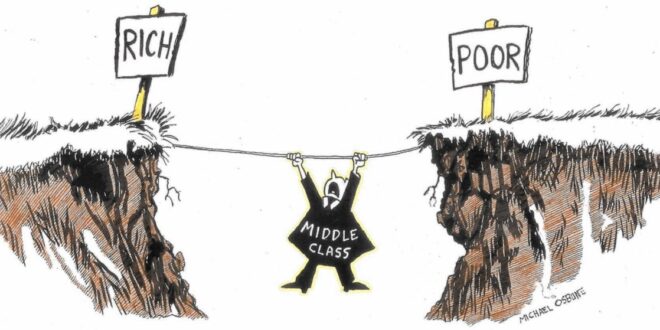Eng. Saleem Al Batayneh
In recent times, a proliferation of intricate terms blending political and economic dimensions has emerged, often escaping our cognitive grasp due to their veiled significance. These terms bear connotations beyond their surface meanings, such as the overarching identity that transcends national identity, yielding itself to vague political manipulation. Phrases like “The New Jordan” and “Risky Economic Growth” have become commonplace, leading to a recycling of enigmatic and unsettling terminology.
Analyzing the farewell speech of the outgoing U.S. Ambassador to Jordan, Henry T. Wooster, presented at the celebration of the 247th U.S. Independence Day by the U.S. Embassy in Amman, sheds light on the political rationality at play. Wooster’s remarks allude to an uncertain economic future for Jordan, laden with potential sacrifices. Such sentiments echo Finance Minister Dr. Mohammad Al-Ississ’ statement over fifteen months prior about the forthcoming “painful sacrifices.”
Wooster’s message, presented in Arabic by Ammon News and in English on the U.S. Embassy’s website, employs linguistic allegory that may confound a non-specialist reader or listener. His complex and convoluted rhetoric requires keen insight to discern his intentions. Known for skillfully navigating and manipulating terminology, Wooster earned the moniker “The Phantom Ambassador” by The Washington Post’s editor-in-chief. Notably, his coining of the term “The New Jordan” before his arrival sparked widespread debate among Jordanians, showcasing his mastery of linguistically elusive statements.
Jordan’s economic stranglehold, akin to a thorny labyrinth on the national map, has consequences reverberating across social and political domains. A revolving door of governments has exchanged roles in the theatre of failure, mirroring a nation unable to foster development, plagued by chronic reliance on debt, aid, and grants. The Jordanian economy remains inept at generating employment opportunities, with successive administrations dismantling domestic production structures across sectors.
Poverty undermines reforms regardless of their nature, rendering genuine political participation and citizenship unattainable. Political rights hinge on socioeconomic rights, yet Jordan can no longer endure procrastination and missed opportunities. Jordanians are fatigued from awaiting solutions that seem elusive, unable to bear the current economic situation that pushes them toward destitution due to rampant unemployment and severe poverty. Economic deterioration poses a greater peril than security destabilization.
The impoverished and the remnants of the middle class are no longer willing to play the role of victims. They have become victims of psychological and mental disarray, struggling to comprehend the irrational and unacceptable inconsistencies they face. Endlessly, we find ourselves immersed in an ongoing state of amusement, aware that our economy lacks transparency.
It is paramount to differentiate between fear and anxiety. Fear stems from a known source, whereas anxiety might lack a discernible origin. Consequently, we grapple with anticipation, suspended between the known and the unknown, yearning for clarity in our path forward.
Al Batayneh was a former Member of the Jordanian Parliament and columnist in a number of media outlets.
 Geostrategic Media Political Commentary, Analysis, Security, Defense
Geostrategic Media Political Commentary, Analysis, Security, Defense





